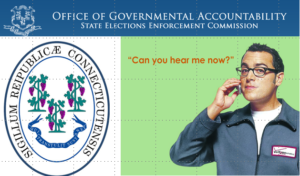 In announcing a $325,000 settlement with the Connecticut Democratic State Central Committee, the State Elections Enforcement Commission (“SEEC”) has made clear that it will not tolerate efforts to circumvent the state’s pay-to-play laws. At issue was the state party’s solicitation of state contractor money into the party’s federal account and subsequent use of those funds to finance mailers in support of Governor Dannel Malloy’s re-election campaign. The agency, which oversees enforcement of Connecticut’s pay-to-play law (Ct. Gen. Stat. 9-612), had earlier chosen to offer a friendly warning not to use federal political party accounts to circumvent the state’s pay-to-play regulatory scheme. As we have previously noted, Connecticut takes some degree of pride in its restrictive pay-to-play statute, and in the fact that the statute’s constitutionality was upheld in federal court. Connecticut is one of those states which will debar a state contractor or prospective state contractor from future business for a full year if it, or its employees, directors, spouses, or children, engage in impermissible contribution activity.
In announcing a $325,000 settlement with the Connecticut Democratic State Central Committee, the State Elections Enforcement Commission (“SEEC”) has made clear that it will not tolerate efforts to circumvent the state’s pay-to-play laws. At issue was the state party’s solicitation of state contractor money into the party’s federal account and subsequent use of those funds to finance mailers in support of Governor Dannel Malloy’s re-election campaign. The agency, which oversees enforcement of Connecticut’s pay-to-play law (Ct. Gen. Stat. 9-612), had earlier chosen to offer a friendly warning not to use federal political party accounts to circumvent the state’s pay-to-play regulatory scheme. As we have previously noted, Connecticut takes some degree of pride in its restrictive pay-to-play statute, and in the fact that the statute’s constitutionality was upheld in federal court. Connecticut is one of those states which will debar a state contractor or prospective state contractor from future business for a full year if it, or its employees, directors, spouses, or children, engage in impermissible contribution activity.
You can thus imagine that the SEEC was none too amused to read news reports back in 2014 highlighting Connecticut Governor Malloy’s prowess in raising funds in $10,000 chunks from state contractors for the Connecticut Democratic Party’s federal account. (PRO TIP: If you are going to “launder” state contractor funds through your federal account, don’t issue press releases airing your dirty laundry). Thus, on February 11, 2014, the SEEC convened a special meeting for the purpose of issuing an unsolicited advisory opinion “clarify[ing] and publish[ing] advice on the use of money and assets of the federal account in Connecticut elections”. Mostly, however, the SEEC used the opportunity to clarify that “[o]f most concern is the fact that much of the reported fundraising has involved Connecticut state contractors, who are prohibited from making contributions to party committees registered with the SEEC,” and to make clear everyone understands that federal “funds that are generally prohibited from being used in Connecticut elections are not, in fact, used to make expenditures in Connecticut elections.”
When the state party failed to acquiesce and acknowledge the SEEC’s inherent wisdom, the Commission filed suit in state court asserting the long-standing principles of administrative law and common law sovereignty referred to by legal scholars as the “Doctrine of Can You Hear Me Now?”
While Connecticut Republicans expressed dismay that the Democratic Party will not have to abandon its argument that federal campaign finance laws “Trump” the Connecticut statute and were able to characterize their payment of $325,000 as “voluntary”, the fact remains that SEEC executive director Michael Brandi was able to state that the penalty was “probably in the range of multiple times what the commission has ever issued in the past” and that to his recollection the previous high-water mark for such a “voluntary” payment was $20,000.
Ultimately, the solution set forth in the proposed settlement agreement involves the common use of separate “Compliance Accounts” within the state party’s federal account. The fix is relatively simple but one which allows state regulators to ensure their guidance is being heard.

